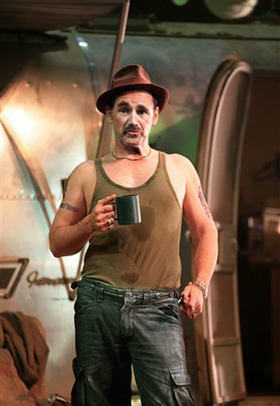 NEW YORK – Warning to Tony Award watchers: Mark Rylance is planning an acceptance speech.
NEW YORK – Warning to Tony Award watchers: Mark Rylance is planning an acceptance speech.
That means you should expect the unexpected.
"At the moment, I have three or four different options," the English actor says with a twinkle in his eye. "It's an interesting little theatrical thing to think about."
Three years ago Rylance baffled the Tony audience at Radio City Music Hall when he went on stage to collect the top acting prize for his work in "Boeing-Boeing" and began talking about what people wear and the roles we all play.
"If you go into the woods, the back country, someplace past all human habitation, it is a good idea to wear orange and carry a gun," he told the crowd. "Or, depending on the season, carry a fishing pole, or a camera with a big lens."
It was comic, confusing and profound, all at the same time. Backstage, the hyper-intellectual Rylance explained that he had been reciting "The Back Country" by Louis Jenkins, an obscure poet from Minnesota.
"I bet most people understood it in many different ways, which was kind of the point of it anyway," he recalls now. "It was the contrast of the poetry of Louis Jenkins and that system of awards - of winners and losers - that intrigued me as a piece of theater, really."
He's been told he has only about 90 seconds to speak if he wins, including the walk up the stage. He's definitely ruled out the traditional listing of peoples' names, finding it unengaging.
"No one else will ever do the poems that I do because they're my thing. So it's tempting to give them another wonderful poem," he says. "It won't be a surprise but I don't think that matters."
There's a very good chance we'll hear something from Rylance since he's stunning critics and theatergoers alike in the powerful role of Johnny "Rooster" Byron in Jez Butterworth's "Jerusalem."
If he wins, he would beat out Brian Bedford in "The Importance of Being Earnest," Bobby Cannavale of "The Motherf---- With the Hat," Joe Mantello in "The Normal Heart" and Al Pacino in "The Merchant of Venice."
Rylance calls being included in such a group "staggering" and leaves a clue about one possible acceptance speech: "To be nominated amongst them, it's hard not to say something about that, really."
Ian Rickson says directing Rylance is like getting on a very powerful motorcycle. "You just have to touch the throttle," he says. "He's a restless - in the best sense - searching, very, very energetic creative spirit."
As Rooster, Rylance is spellbinding as the charismatic leader of a band of social misfits and outcasts squatting in the English woods. Set over the course of a single day, the play examines how Olde England battles modern Britain.
Butterworth says he wrote the iconoclastic part with Rylance in mind, but the actor hopes others will try. "I think there are a number of actors who could play Rooster," he says. When asked who, Rylance suggests Gary Oldman.
It is Rylance's second play on Broadway this season after co-starring with David Hyde Pierce in a production last year of David Hirson's "La Bete," playing a buffoonish street performer. In an odd twist, both plays landed in the same theater - The Music Box.
In the first play, Rylance donned a pair of terrible false teeth and delivered an astonishing, 20-minute soliloquy that was pure bravado. In the new play, he is virtually on stage for the entire three-hours-plus play, stumbling about, getting into fights, smoking drugs and hysterically cocking his snoot at everyone the entire time.
"I guess I've put a lot of time in my career into drama that has a lot of words," says Rylance. "Maybe why I'm drawn to these plays is the ambition of the writing excites me. It's fun for me, at 51, to be given such challenges."
"Jerusalem" - like "La Bete" before it - was an import from London and some were worried that it's English-ness would turn off Americans, but Rylance had confidence. It helped that he has spent a lot of time on these shores.
He recalls riding on a motorcycle with a friend from Fort Lauderdale, Fla., to San Francisco in 1985 and being amazed that so many towns along the way looked like each other. That loss of pluralism, of difference - he blames it on consumerism - is what his play is all about.
"I was always kind of confident that it was further progressed in America than England," he says. "If anything, my concern was that it was so far progressed in America that people wouldn't get it anymore."
Though born in England, Rylance and his family moved to Connecticut when he was 2 and then later to Wisconsin, where the young actor attended high school. He returned to England to attend The Royal Academy of Dramatic Art at age 18, acknowledging that it was odd to be a Midwestern boy in London.
"I felt fake in my voice for a long time," he says. Until that changed, he threw himself into the physical parts of acting - the movement, the body training - that are his hallmark today.
In an interview, Rylance reveals flashes of self-consciousness and shyness, in dramatic contrast to the monumental ego expected from a man considered the best stage actor of his generation.
"What I particularly enjoy is being someone other than who I am," he says. "I love putting my own consciousness into a kind of driving seat at the back that's observing the whole thing while another side of me is playing games."
He found his best ally in Shakespeare, first at the Royal Shakespeare Company in 1982 and then as the first artistic director of Shakespeare's Globe in London from 1995 to 2005.
"From the age of 16 to 46, it was something I was never far away from," he says. "I was trying to step away from it, but I kept getting offers that were too challenging not to take up."
He has played many of the Bard's heroes - Henry V, Romeo, Bassanio, Richard II - and even some of the playwright's heroines. To be true to the male-only Elizabethan era acting policy, Rylance played Cleopatra in "Antony and Cleopatra" and Olivia in "Twelfth Night."
And he's not inclined to seek a career in film or television, because he says he'd never be able to compete with established stars and meaty roles on film don't happen too often.
"The stage is my love," he says. "And I am blessed with a love of doing it every night - eight times a week. I feel transported by that. I get tired but I'm like one of those runners who is out every morning running.
"I do like the challenge of being present time after time like that."
Copyright © 2011 The Associated Press. All rights reserved.
- Comment









